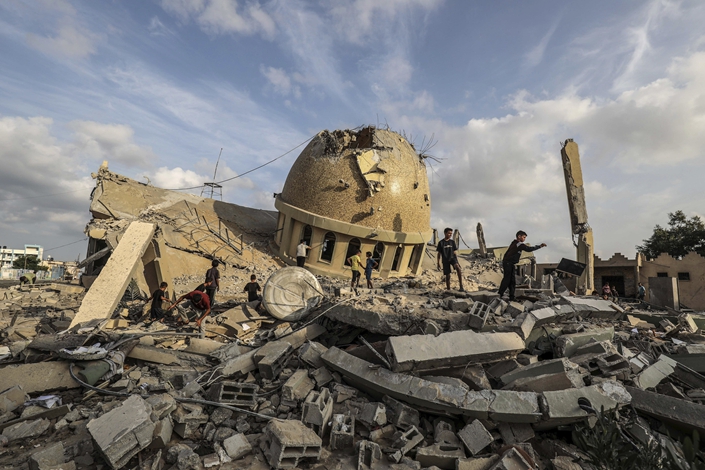Beijing’s Diplomatic Plea in Egypt
China’s envoy for the Middle East, Zhai Jun, conveys a strong message calling for an immediate ceasefire and diplomatic resolution in the Israeli-Palestinian conflict while meeting with Arab League chief Ahmed Aboul Gheit during a summit in Egypt.
The Quest for Peace Amidst Brutality
As Egypt hosts a “summit for peace,” UN Secretary-General Antonio Guterres urgently appeals for swift action to end the ongoing Israeli-Palestinian crisis, marking two weeks of violence and suffering in Gaza.
China’s Historical Stance on the Conflict
China, traditionally supportive of the Palestinian cause and a two-state solution, emphasizes that force is not the path to resolution and underscores the need to break the cycle of violence, though Israel and Hamas are not explicitly mentioned in the statement.
Beijing: Amidst the ongoing Israeli-Palestinian crisis, China has once again appealed for an immediate ceasefire, emphasizing that the use of force is not a viable means to resolve the escalating conflict. The call for diplomacy and peace came from China’s envoy for the Middle East, Zhai Jun, during a diplomatic meeting in Egypt, as the world continues to witness the brutal and devastating consequences of the conflict.
Egypt served as the host for a significant “summit for peace,” which brought together international leaders and diplomats in an effort to address the crisis. UN Secretary-General Antonio Guterres, a key figure at the summit, issued an urgent plea for swift action to bring an end to the ongoing nightmare that has plagued the region for the past two weeks.
During the summit, Zhai Jun, representing China, met with Arab League chief Ahmed Aboul Gheit on the sidelines. In this crucial diplomatic exchange, Zhai reiterated China’s call for an “immediate ceasefire and an end to the fighting as quickly as possible.” The Chinese diplomat made it clear that Beijing believes that the use of force will not lead to a resolution of the problem and will only perpetuate a cycle of violence and revenge.
Notably, Zhai’s statement did not explicitly mention Israel or Hamas, the Palestinian organization. China has historically maintained positive relations with Israel, but it has consistently supported the Palestinian cause and advocated for a two-state solution to the Israeli-Palestinian conflict.
China’s diplomatic involvement in the Israeli-Palestinian crisis underscores its commitment to peaceful conflict resolution and its long-standing support for the Palestinian people. While not naming specific parties in the conflict, China’s stance is a testament to its advocacy for a diplomatic solution that addresses the root causes of the ongoing violence and suffering in the region.
The “summit for peace” in Egypt brought together leaders and diplomats from across the globe who share the collective goal of finding a path to de-escalation and lasting peace. UN Secretary-General Antonio Guterres used the platform to issue a heartfelt plea, calling for swift action to end the “godawful nightmare” that has plagued the Palestinian territories, particularly Gaza, for the past two weeks.
The crisis has exacted a devastating toll on the civilian population in the region, with countless lives lost and infrastructure destroyed. The urgent need for an immediate ceasefire and a return to the negotiating table is apparent, and the international community is intensifying its efforts to bring about a resolution.
While diplomatic initiatives are underway and calls for peace and dialogue resound globally, the situation in the Israeli-Palestinian crisis remains fluid and challenging. The voices of leaders like Zhai Jun and Antonio Guterres echo the desire for a peaceful resolution, but the path to achieving it remains fraught with complexities.
The world continues to watch and hope for a breakthrough that can end the violence and pave the way for a lasting and just resolution to the Israeli-Palestinian conflict. In this pursuit, diplomacy, ceasefires, and international dialogues play an essential role in the quest for peace.















